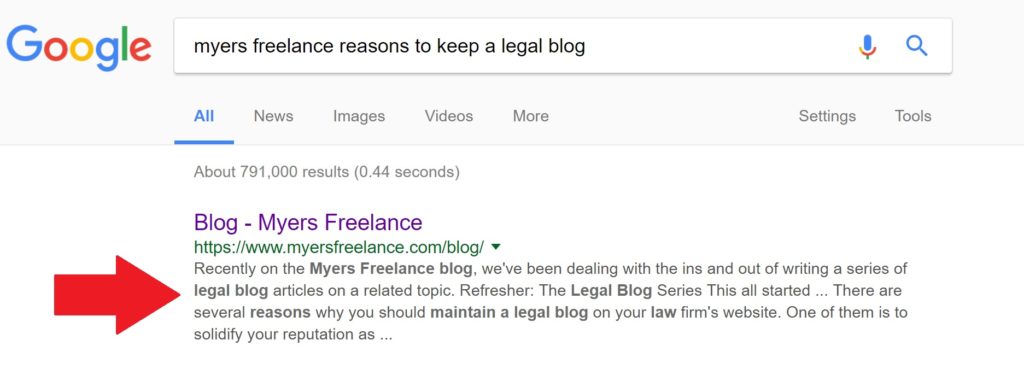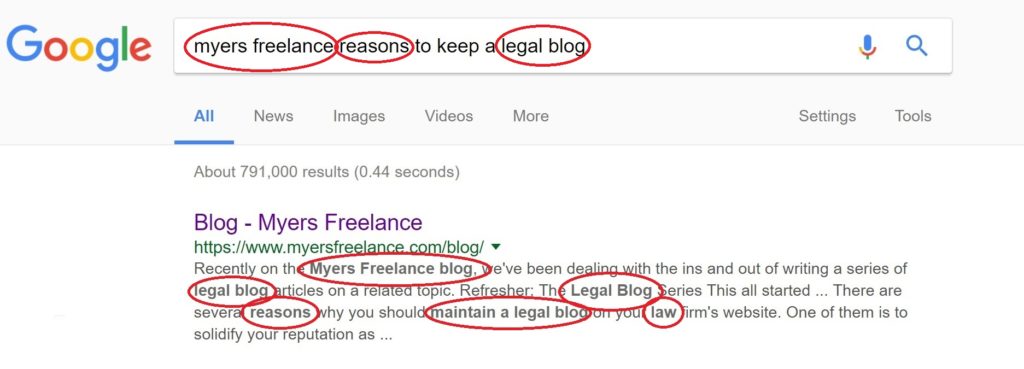[UPDATE 5/15/2018: The length of Google’s meta descriptions is now officially defined as “dynamic,” and fluctuate between around 155 (130 for mobile) and 320]
If you want more clients for your law firm, then search engine optimization (SEO) is a means to that end. However, not all aspects of online marketing fall into the category of SEO, per se. There are other techniques that you can use online to attract potential clients to your firm’s website that don’t involve promoting it in targeted searches.
Like meta descriptions, which don’t impact your SEO, but do appeal directly to interested clients.
In recent weeks, Google has been lengthening these meta descriptions, which could change how you write them for future posts, as well as what gets shown in the search engine results page (SERP) for the content you’ve already posted.
Meta Descriptions, Reviewed
The meta description is the short synopsis of a page or post that gets shown directly in the SERP’s listing of that page:

Google announced long ago that a page’s meta description does not impact its SEO, and there is little to suggest that anything has changed, on this front. However, just because the meta description doesn’t score SEO points doesn’t mean it doesn’t matter: It’s one of the few things that web users can use to gauge the value of a site before they click on it from the results page.
As the page’s creator, you have the opportunity to write a meta description that attracts viewers, providing a valuable opportunity to increase your site’s traffic. However, even if you do take this opportunity, Google will occasionally ignore the meta description you’ve written and replace it with an excerpt from your page, especially if that excerpt has a lot of the keywords that were used in the user’s search query (shown in bold in the results):

Google Expands Meta Description
Meta descriptions used to be 155 characters long. This provided little room to do more than briefly summarize the post.
Recently, though, Google has been experimenting with an expanded meta description. Starting in the middle of November, 2017, they’ve bumped the meta description character allowance into the high 170s, and then the upper 220s at the beginning of December. Now, meta descriptions are running into the 330s.
What This Means for New Posts
Posts that you haven’t published on your law firm’s website yet can take a meta description with far more detail, now. This lets you tease out your content and get more creative, while also letting you avoid gross over-generalizations about a potentially complex legal topic.
What This Means for Old Posts
The posts that you’ve already published online, though, will still have their older, and much shorter, meta descriptions. Because these old meta descriptions are only about half as long, they are far less likely to have many of the search query’s keywords in them. This highlights the need to go back and update them, because controlling your meta description is important.
The Double-Edged Sword of a Longer Meta Description
The extra length in a meta description can be both a blessing and a curse.
 On the one hand, it gives you more room to explain what the post will be about. Like a book’s cover and inside flap, it can effectively pique a potential reader’s interest, increasing the chances that they take the plunge and commit to the rest of it.
On the one hand, it gives you more room to explain what the post will be about. Like a book’s cover and inside flap, it can effectively pique a potential reader’s interest, increasing the chances that they take the plunge and commit to the rest of it.
On the other hand, now that there are more characters available, this excerpt can be longer, making it more likely that there’s one in your post that has more keywords than the snippet you provided, increasing the chances that the meta description you wrote for your post gets ignored in favor of the excerpt.
You don’t want to happen, though, because the meta description is an opportunity to control how well your post appeals potential readers.
The best way to prevent Google from walking over your carefully-constructed meta description and dropping an article excerpt into the results page is to play their game, making sure that yours has the same kind of keyword density that any replacement excerpt might have.
Of course, this is easier said than done.
Further Developments Could Complicate Matters
This new roll out highlights the willingness of search engines to experiment with their user formats. As of this writing, it’s unclear which direction Google will take the lengths of their meta descriptions, and whether they adjust how often post excerpts will trump one that has been provided. If you’re serious, rely on online marketing to bring in a bulk of your clients, and have the time, though, it would be wise to revisit your old meta descriptions and bring them up to date.